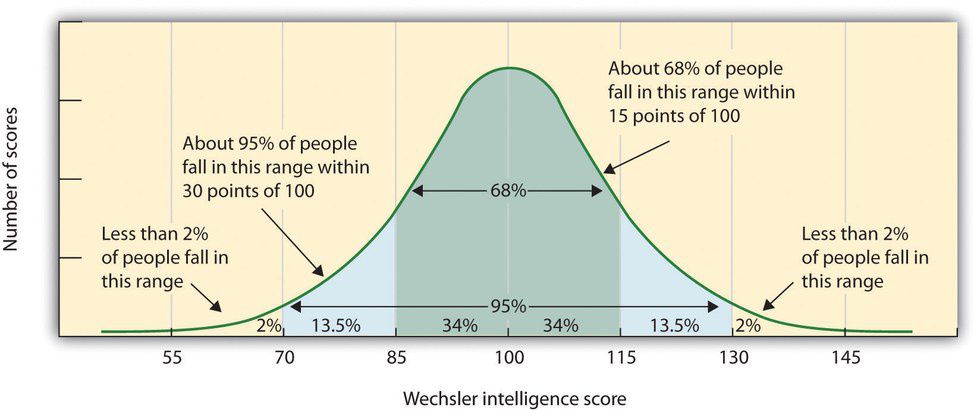Sometimes we can fall into thinking that people are constantly getting dumber. For instance, this presidential election is the dumbest in American history, right? It's not, but the point still stands: it's easy to feel like our generation is idiotic compared to past ones. In a pleasantly surprising twist called the "Flynn effect," the average IQ score has been rising steadily "in every age range, at every ability level, and in every modern industrialized country" over the past century.
While IQ (intelligence quotient) is used interchangeably with terms like "general intelligence" and "mental ability" to describe any measure of overall intelligence, the standardized IQ tests adjust their scoring system to fit the population. The average score is set to 100 with a standard deviation (how far away a score usually is from the average) of 15, so the distribution of IQ scores resembles what statisticians call a normal curve:
Your IQ score is measured against the general population. So the scoring system has to be updated and re-standardized to match the population as it changes. While looking through data from older IQ tests, psychologists James Flynn noticed an odd trend in IQ score adjustments since the 1940s. Whenever they were updated, the test scores always had to be adjusted upwards. Scores had to be artificially lowered because the average IQ was increasing by three points every decade.
Three points per decade may not sound like much, but as Stephen Pinker points out in his book "The Better Angels of Our Nature: Why Violence Has Declined," "An average teenager today, if he or she could time-travel back to 1950, would have an IQ of 118. If the teenager went back to 1910, he or she would have an IQ of 130, besting 98 per cent of his or her contemporaries."
When plotted on a graph, the Flynn effect is surprisingly linear:
The different types of IQ shown on that graph measure critical thinking skills (fluid IQ), amount of knowledge one can apply (crystallized IQ), and ability to imagine images to solve problems (spatial IQ). Each of these is linked to activity in important regions of the brain. Taken together, these form "fullscale" or "general" intelligence, which is what IQ scores refer to.
Some have criticized the importance of IQ since it excludes things like "street smarts" and it isn't fixed for life. However, IQ is correlated with a wide variety of important real-life factors such as academic achievement, social mobility, job performance, lifespan, and later life health. Put simply, general intelligence matters in everyday life.
The Flynn effect rest on a solid foundation of research and has been confirmed through multiple types of tests and thousands of individual results. To oversimplify a bit, everyone agrees that IQ scores have risen but no one agrees why. A wide variety of different factors have been identified, and which one matters most is still debated.
Flynn himself has pointed to the Industrial Revolution and its societal effects as one of the main causes. More specifically, he mentioned that family sizes have shrunk which allows more adult vocabulary in the household, that formal schooling has improved and is focusing less on rote memorization, that mentally demanding professions have become increasingly common, and that even in their leisure time people are pursuing cognitively taxing activities like video games instead of simply trying to recover from work.
He also mentioned that the way we think has become more scientific — newer generations prefer deductive reasoning and logic instead of relying on personal experience. For example, Russian neuroscientist Alexander Luria found in the Soviet Union that some indigenous groups didn't treat hypotheticals how students are taught to treat them. When Luria asked questions such as "Where there is always snow, the bears are white; there's always snow at the North Pole. What color are the bears there?" then one indigenous man said that he had never seen white bears, but if a wise man came from the North Pole and said that white bears live there, he might believe him. In contrast, as Flynn said, "Now virtually all formal schooling, when you get past the sixth grade...means that you take hypotheses seriously. This is what science is all about."
One might think that the increases come from students getting better at taking IQ tests. But the amount
of IQ tests taken has declined since the middle of
the 20th century without altering IQ gains, and those gains are lowest for students more familiar with tests
Some have suggested improved nutrition and health as a possible explanation. Others point to increases in the use of lights and visual media in modern society, since they have created a more stimulating environment. Whatever the reason may be, it is encouraging to learn that people all over the world are becoming more intelligent and opening their minds to the vast wealth of knowledge that we as a species have discovered.























